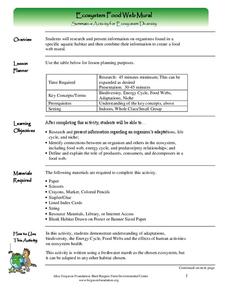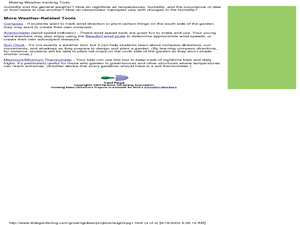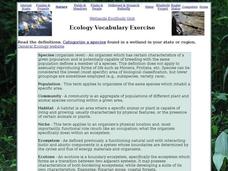Core Knowledge Foundation
A Time for All Seasons - Spring
Celebrate the arrival of spring with this fun primary grade science unit. Engaging young scientists with a variety of hands-on activities and inquiry-based investigations, these lessons are a great way to teach children about seasonal...
Core Knowledge Foundation
A Time for All Seasons - Summer
The sun is shining and the birds are singing, what better time to teach young learners about the fun season of summer. In this week-long science series, children learn how the rotation and orbit of the earth influence the days and...
Core Knowledge Foundation
A Time for All Seasons - Winter
As the days get shorter and a chill enters the air, it's time to start teaching your little ones about the wondrous winter season. Through a series of teacher demonstrations, whole-class read alouds and discussions, and hands-on...
Curated OER
Beaver Ecology
Students explore the lives of bgeahvers. They identify the physical and behavioral adaptations that help beavers survive in their environment. Students compare and contrast how beavers influence the ecology of both forest and aquatic...
Curated OER
Getting a Handle on Your Bee
Students observe dried bees, carefully glue them to toothpicks, and use them for cross pollinating their Brassica plants. They also describe reasons why two similar investigations can produce different results. Finally, students...
Curated OER
Exploring Limu Diversity
Students explore limu diversity. In this ocean ecosystem lesson, students classify limu according to its physical properties. Students work in small groups to generate scientific observations and sort limu by characteristics.
Curated OER
Ecosystem Food Web Mural
Learners create a food web mural about an ecosystem of the freshwater marsh. For this food web lesson plan, students write about the organisms and how each one depends on another.
Curated OER
Food Web Follies
Seventh graders cut and paste animal pictures to create a food web and trace the path of energy. They write a paragraph explaining the importance of photosynthesis in all food webs.
Curated OER
Mass vs. Weight
Students explore physical science by conducting a measurement experiment. In this mass lesson, students identify the differences between mass and weight and define a list of other vocabulary terms. Students utilize electronic scales and...
Curated OER
Planetary Orbits
Middle schoolers explore space science by completing a solar system identification worksheet. In this planets lesson, students discuss the different planets in our star system and identify their traits. Middle schoolers complete an...
Curated OER
Illnois River and Lake Mussel Habitat Diorama Activity
Students identify the environmental elements of river and lake mussels. They compare the elements to the time before settlement and during industrialization. They also participate in a field trip to a mussel exhibit.
Curated OER
Plants and Animals of Great Bay Animals and Plants of the Estuary
Students participate in a webquest about the plants and animals that inhabit an estuary. They role play as environmentalists researching this habitat and present the results of their research in a creative way.
Curated OER
North American Butterflies and Moths of Fields, Meadows, and Fencerows
In this North American butterflies and moths worksheet, students click on the links in the questions about North American butterflies and moths of fields, meadows, and fencerows to find the answers to the questions and then come back and...
Curated OER
Making Weather-Tracking Tools
Students build tools to help track the weather. For this weather lesson, students follow directions to build a rain gauge, barometer and hair hygrometer.
Curated OER
Ecology Vocabulary Exercise: Wetlands
In this ecology vocabulary exercise: wetlands worksheet, students read the definitions of 8 words, then categorize a species found in a wetland in their region. This page has numerous links to helpful web resources.
Curated OER
Now You See It, Now You Don't
Students explore organic and inorganic objects. In this environmental lesson students perform a composting experiment using flowers in different soils. Students record their observations.
Curated OER
Ecology Vocabulary
In this ecology activity, students read the vocabulary words and then categorize a species found in a field, meadow, or fencerow in their state or region. Students complete 6 problems.
Curated OER
Bluebirds Ecology Vocabulary Exercise
In this bluebirds learning exercise, students categorize bluebird species found in their state and define vocabulary related to it. Students complete 6 vocabulary words.
Curated OER
Home Sweet Home
Students examine the animals that live in trees. They identify their sounds, footprints and droppings. They draw pictures of the animals as well.
Curated OER
And the Rains Came Down: A South American Rainforest
Students examine the characteristics of a South American tropical rainforest. They analyze maps, develop graphs, listen to the book, The Great Kapok Tree, and create a rainforest mural.
Curated OER
It's Okay to Exhale: Photosynthesis and Cellular Respiration
Pupils will observe the differences between photosynthesis and cellular respiration. Then they observe the links due to climate changes and relate how climate change affects their lives.






















